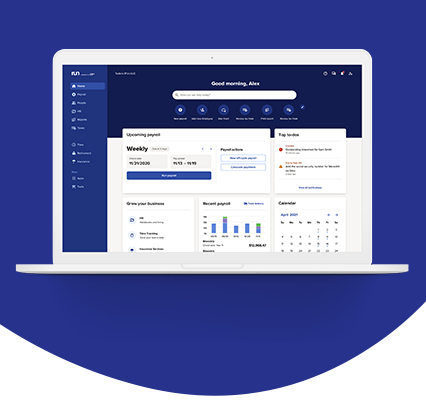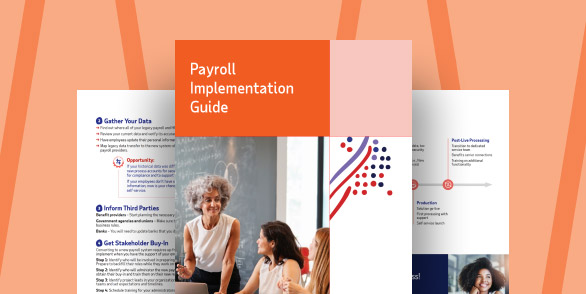Many entrepreneurs and freelancers find that S corporations are an attractive way to structure their business because of favorable tax benefits that it affords them. Taking advantage of these savings, however, often hinge on the business owner’s ability to process payroll correctly.

Understanding S corporations and payroll
An S corporation is a business that enjoys the benefits of incorporation without double taxation. The shareholders pay income tax on their earnings, but the corporation as a separate entity does not. What’s more, shareholder distributions aren’t subject to Medicare and Social Security taxes, also known as Federal Insurance Contribution Act (FICA) taxes.
So, what stops S corporation members from taking all their income as a distribution? Shareholders, if they perform work for the business, are also considered employees and must earn a salary. As a result, most S corporations, even if they only have one shareholder/employee, need a reliable means of running payroll.
How do S corporations run payroll?
Similar to other business with employees, S corporations run payroll by calculating income tax, FICA taxes and unemployment taxes based on the wages earned during a given pay period. Yet, they are unlike some larger organizations because they tend to have more flexibility with payroll, especially if there’s only one employee/shareholder. In these cases, individuals may pay themselves in varying frequencies or even divide their income into a few small payments and a large year-end bonus.
How do S corp owners pay themselves?
Those who are both an employee and a shareholder in an S corporation generally pay themselves via distributions and a salary. The latter is necessary if the individual performs more than minor services for the business. Here’s how paying an S corporation salary is done:
1. Set a reasonable salary
S-corporation shareholder-employees must earn a salary that’s comparable to what similar businesses pay their employees for the same type of work.
2. Calculate payroll and taxes
Once they’ve determined their salary, S corporation owners divide the annual figure by the number of pay periods (monthly, quarterly, etc.). The result is then used as the basis for calculating income tax, FICA taxes and unemployment taxes.
3. File federal quarterly payroll taxes
Shareholder-employees filing their taxes quarterly generally use IRS Form 941, Employer's Quarterly Federal Tax Return to report the income taxes and FICA taxes withheld from their salary, as well as the portion of payroll taxes paid by the S corporation. They may also have to file Form 1040-ES, Estimated Tax for Individuals, which reports estimated taxes on any additional income not subject to withholding.
4. Record payroll transactions
For recordkeeping and reporting purposes, S corporations generally categorize their payroll transactions as either wage expenses (salary and income tax), payroll taxes or shareholder distributions.
5. File state payroll taxes
S corporation owners who have to pay state income tax and unemployment tax usually can file these payments quarterly as they do with their federal taxes. Some states even use tax return worksheets that are similar to the IRS Form 941.
6. Prepare annual tax returns
At the end of the year, S corporations generally have to prepare the following tax documents:
- Form W-2, Wage and Tax Statement – reports an employee’s total income and taxes withheld from wages
- Form W-3, Transmittal of Wage and Tax Statements – summarizes an employee’s W-2 for the Social Security administration
- Form 1120S, U.S. Income Tax Return for an S Corporation – reports the business’ income, gain, losses, deductions and tax credits
- Schedule K-1 (Form 1120-S), Shareholder’s Share of Income, Deductions, Credits, etc. – reports an individual shareholder’s income, deductions and tax credits
What is a reasonable salary for S corp owners?
As stated previously, a reasonable salary for S corporation owners is one that a comparable business would pay an employee to perform similar job duties. Other factors that the IRS uses to determine reasonable compensation are:
- Training and experience
- Time and effort devoted to the business
- Dividend history
- Payments to non-shareholder employees
- Timing and manner of paying bonuses to key people
- Compensation agreements
- The use of a formula to determine compensation
If after weighing these considerations, the IRS concludes that an S corporation owner did not receive a reasonable salary, they can reclassify distributions received as salary. This means the owner would have to pay back payroll taxes on that income, as well as any penalties the IRS imposes.
How much salary is reasonable?
To determine a reasonable salary, S corporation owners can purchase compensation analysis reports or conduct their own research using the Bureau of Labor Statistics and other sites that provide salary information. Once a suitable figure is found, it may have to be adjusted to individual circumstances. For instance, owners might decide to lower their salary if they’re not working for the S corporation full time or if assets contributed more towards their profits than their labor. It’s also important to note that the IRS typically doesn’t require S corporation owners to pay themselves if their business isn’t generating any income.
What is the 60/40 rule?
The 60/40 rule is a simple approach that helps S corporation owners determine a reasonable salary for themselves. Using this formula, they divide their business income into two parts, with 60% designated as salary and 40% paid as shareholder distributions. Although many accountants use the 60/40 rule of thumb, it’s not officially approved by the IRS.
How can ADP support S corp payroll needs
ADP understands that payroll can be challenging, even for S corporations with just a few employees or a single individual wearing many hats. We offer payroll services that are designed to help small business owners minimize administrative burdens, so they can focus more of their time on what made them want to be an entrepreneur in the first place.
Our small business payroll can:
- Process payroll quickly, either in the office or remotely
- Automatically calculate, deduct and pay taxes
- Identify mistakes before they result in costly penalties
- Help comply with government regulations for employers
- Integrate seamlessly with timekeeping and accounting software
Frequently asked questions about S corp payroll
Does an S corp have to have payroll?
An S corporation generally must have payroll to pay its employees and any shareholders who may be considered employees. After the salaries are paid, any remaining business profit may be passed through to the shareholders via distributions.
Do S corp owners need to be on payroll?
S corporation owners who perform more than just minor work for the business typically need to be on the payroll because they must pay themselves a reasonable salary. Owners who take a salary that’s below market value for the services they perform or claim all of their income through shareholder distributions may be audited and penalized by the IRS.
Can you pay yourself on a 1099?
Since IRS Form 1099-MISC, Miscellaneous Income and Form 1099-NEC, Nonemployee Compensation are intended to report payments made to individuals who are not employees, they are generally not an option for S corporation owners, many of whom are also employees. These individuals may report their salary earnings via Form W-2 and any income received through shareholder distributions via Schedule K-1.
Does an S corp pay payroll taxes?
S corporations typically pay payroll taxes – Medicare and Social Security taxes – on any salaries paid to employees. Shareholders distributions don’t incur payroll taxes, but they are subject to income tax.
Does a single person S corp pay self-employment tax?
Single person S-corporations don’t have to pay self-employment tax because the owner generally earns a salary. Payroll taxes are deducted from these earnings and the S-corporation pays the employer portion of the Medicare and Social Security taxes. This makes self-employment tax, which constitutes both the employee and employer payroll tax responsibilities, unnecessary.
This guide is intended to be used as a starting point in analyzing an employer’s payroll obligations and is not a comprehensive resource of requirements. It offers practical information concerning the subject matter and is provided with the understanding that ADP is not rendering legal or tax advice or other professional services.




